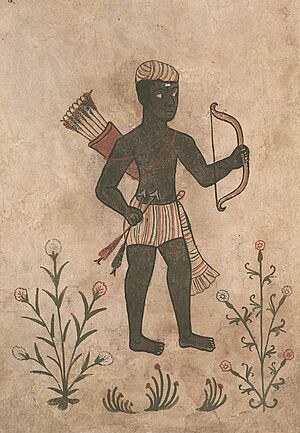First battle of Dongola facts for kids
Quick facts for kids First battle of Dongola |
|||||||
|---|---|---|---|---|---|---|---|
| Part of the Muslim conquests | |||||||
|
|||||||
| Belligerents | |||||||
| Rashidun Caliphate | Kingdom of Makuria | ||||||
| Commanders and leaders | |||||||
| Uqba ibn Nafi | Qalidurut | ||||||
| Strength | |||||||
| 20,000 Cavalry | 8,000–10,000 Archers and Cavalry | ||||||
| Casualties and losses | |||||||
| 10,000–15,000 dead | c. 1,000 dead c. 1,000 wounded |
||||||
The First Battle of Dongola was an important fight in 642. It happened between the early Muslim Rashidun army and the Christian Nubian people. These Nubians were part of the Kingdom of Makuria. The battle took place in Dongola, which was the capital of Makuria.
The Nubians won this battle. Their victory stopped the Arab armies from moving further into Nubia for a while. It also created tension between the two groups. This tension lasted until another big battle, the second battle of Dongola, in 652.
Contents
Why the Battle Happened
Christian Kingdoms in Nubia
Long ago, in the 500s, the area once ruled by the Kingdom of Kush became Christian. This region included three kingdoms: Alodia, Makuria, and Nobatia. These kingdoms were located just south of Egypt.
Rise of Islam
About 100 years later, the religion of Islam brought the Arabs together. By 632, they had become a strong military and political power. They began to expand their lands.
Muslims Conquer Egypt
In 640, a Muslim military leader named Amr ibn al-As conquered Byzantine Egypt. To make sure the Muslims fully controlled Egypt, they needed to secure its borders. This meant protecting the western and southern edges. So, Amr sent armies to Byzantine North Africa and to Nubia, where Makuria was located.
The Battle of Dongola
In 642, Amr ibn al-As sent a large army to Makuria. This army had 20,000 horsemen. It was led by his cousin, Uqba ibn Nafi. They traveled all the way to Dongola, the capital city of Makuria.
But something unusual happened. The Arab forces were defeated and pushed back. This was a rare loss for the powerful Rashidun Caliphate at that time.
Nubian Archers
According to a historian named al-Baladhuri, the Nubians fought very strongly. They met the Muslim army with many arrows. Many Arab soldiers returned with injuries, especially to their eyes. Because of this, the Nubians were called 'the pupil smiters'.
Al-Baladhuri also shared a story from someone who visited Nubia twice. This person said: "One day they came out against us and formed a line. We wanted to use swords, but we were not able to. They shot at us and put out eyes to the number of one hundred and fifty."
Makurian Victory
The Nubian victory at Dongola was one of the few times the Rashidun Caliphate lost a battle in the mid-600s. The Nubians were very good at shooting arrows. They also had experienced cavalry, which are soldiers on horseback. Their skills made Amr ibn al-As lose confidence. He decided to pull his forces out of Nubia.
Arab Retreat from Nubia
Arab historical writings say that the trip into Nubia was not a Muslim defeat. But they also admit it was not a success. Amr ibn al-As had sent his armies into Nubia and North Africa on his own. He thought these would be easy wins. He planned to tell the caliph, the Muslim leader, after the victories.
The Arab sources also say there were no huge, planned battles in Nubia. However, they do mention a surprise meeting. Uqba ibn Nafi and his soldiers suddenly came across many Nubians. The Nubians quickly started fighting before the Muslims could attack. In this fight, 150 Muslim soldiers reportedly lost an eye.
Arab sources give more credit to the Nubians' guerrilla tactics. These are hit-and-run attacks, not big battles. They claim the Nubians would call out to their Muslim enemies from far away. They would ask where the Muslim soldiers wanted to be hit by an arrow. The Muslims would joke back, and the arrow would hit them exactly there. This story, along with the idea that Nubian horsemen were better at quick attacks, suggests the Nubians were winning in small fights, not huge battles.
No matter the exact situation, Uqba ibn Nafi could not succeed in his mission. He wrote back to his cousin, Amr, saying he couldn't win against these tactics. He also said Nubia was a very poor land with no valuable treasure. Uqba might not have been exaggerating, as Nubia is surrounded by tough deserts. When Amr heard this, he told his cousin to leave Nubia, which he did.
What Happened Next
Al-Baladhuri says Amr decided to pull his armies out for two main reasons. First, there wasn't much treasure to be found. (Even though Nubia was actually rich in gold and farm goods). Second, the Nubian army proved to be very strong. So, it was thought better to make peace.
However, Amr still wanted to fight elsewhere. Real peace between Muslim Egypt and Christian Makuria only truly happened when Abdullah Ibn Sa'ad became the new leader in 645. This peace would last for a long time. It continued until the second battle of Dongola. The result of that battle led to one of the longest peace treaties ever recorded in history.
Sources


